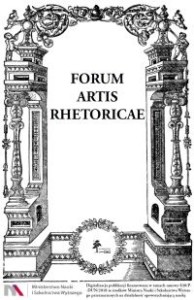Lector Benevole!
Gdy na początku roku 2020 Redakcja zdecydowała, iż cały rocznik, podzielony
na cztery tomy, zostanie poświęcony tematowi RETORYKA I MANIPULACJA,
nic nie wskazywało, że czeka nas całkowita zmiana sytuacji w kraju. Informacje,
jakie nas „zalały” w wyniku pandemii koronawirusa, zachęciły Redakcję, aby zbadać,
jak przebiegała komunikacja w tym zakresie. Jednak badania takie wymagają
czasu i materiały pojawią się najwcześniej w III i IV tomie. Niniejszy tom zawiera
zatem studia, które wcale lub bardzo luźno związane są ze zmienioną sytuacją
w naszym kraju.
W Editorialu do tomu I przypomnieliśmy, za tradycją Marka Fabiusza Kwintyliana
[QUINT., V.10.54], jak rozumieć retorykę; drugi z terminów, jak sugeruje
Bernd Wirkus2, pojmujemy dwojako: „neutralnie” bądź „pejoratywnie”.
Tom I zawiera studia, które są poświęcone różnym aspektom tegoż zjawiska.
Studium Jakuba Z. Lichańskiego Nieintencjonalne manipulowanie przekazem
naukowym (Unintended manipulation of the scientifi c message) rozpatruje
to zagadnienie głównie w perspektywie błędów, jakie pojawiają się w rozumowaniach
(wszystko jedno czy logicznych, czy retorycznych). Zarazem autor pragnie
pokazać, iż można takich błędów uniknąć, odwołując się do teorii status.
Studium Natalii Rudnickiej i Anastasiyi Chvankovey Analiza informacji
w mediach polskich i rosyjskich w dniu odebrania Nagrody Nobla przez Olgę
Tokarczuk (Analysis of information in Polish and Russian media on the day
of receipt of the Nobel Prize by Olga Tokarczuk) jest przykładem tzw. case study;
autorki rozpatrują w nim sposób przekazania bardzo ważnej treści, jaką jest
informacja o przyznaniu Nagrody Nobla Oldze Tokarczuk. Także wskazują,
jak ten zdawałoby się prosty przekaz, w zależności od źródła okazywał się dla
odbiorcy niejasny.
Ostatnie studium Anny Perzyńskiej Literacka i paraliteracka twórczość
w Internecie (na polskich i obcojęzycznych przykładach z lat 2001−2017) [Literary
and paraliterary creativity on the Internet (on Polish and foreign-language
examples from 2001−2017)] jest poświęcone szerzej problemowi nie tyle
manipulacji, co „literackiemu uwikłaniu Internetu”. Jednak uważna lektura
tego studium uświadamia, jak łatwo jest przekroczyć granicę pomiędzy właśnie
literaturą a manipulacją. Szczególnie wtedy, gdy dąży się do efektu, a inne cele
tekstu zostają zaniedbane.
Na zakończenie Redakcja publikuje tekst, który jest świetnym przykładem
manipulacji — jest to napisana pod koniec lat 60. XX wieku przez śp. Stefana
Lichańskiego fi kcyjna mowa obrończa wilka oskarżonego o zjedzenie jagnięcia
Niniejszy tom przynosi kolejne studium tzw. case study. Aleksandra Chojecka
analizuje, na wybranych przykładach, jak z jednej strony opisywana jest kwestia
szkolnej edukacji seksualnej w Polsce; z drugiej — pokazuje jak kwestia ta,
w przekazie informacyjnym, została zmanipulowana — Czy edukacja seksualna
jest przestępstwem? W jaki sposób wybrane media internetowe przedstawiają
projektowane zmiany prawa karnego w odniesieniu do edukacji seksualnej
w Polsce (studium przypadku) [Sex education posing a crime? Th e way selected
internet media present proposed changes to criminal law in relation to sex education
in Poland (case study)].
Kolejne studium to obszerne omówienie książki Edwarda Bernaysa3 wydanej
w roku 1928 pt. Propaganda. Jest to jedno z najważniejszych opracowań dotyczących
nie tylko technik manipulacji, ale, co ważniejsze, uzasadnienia konieczności
stosowania tych technik w zarządzaniu nowoczesnym państwem. Studium
Bernaysa pokazuje też, jak było kształtowane nowoczesne społeczeństwo.
W omówieniu tym pojawia się także komentarz retoryczny. Ambicją Wydawcy
było ukazanie, jak pewne kwestie — wydawałoby się odległe od retoryki — są de
facto w nią uwikłane. Do niektórych zagadnień jednak Wydawca będzie się starał
jeszcze powrócić, bowiem część kwestii wymaga obszerniejszego wyjaśnienia.
Dwa pierwsze tomy z serii RETORYKA I MANIPULACJA prezentują studia,
które w swym założeniu miały być analityczne. Pokazują, jak autorzy — w sposób
świadomy bądź nieświadomy — manipulują informacją, która, zdaniem Redakcji,
mogłaby być przekazana w sposób prosty i jednoznaczny. Szczególnie jest to
uderzające w książce Bernaysa, mimo że autor stara się, aby jego studium miało
charakter wyłącznie opisowy, ale z różnych przyczyn takim nie jest. Wynika
to także z faktu, na który zwracano uwagę, iż autor nie sprecyzował faktycznie
przedmiotu, któremu poświęcił obszerne studium.
Mimo wad tego studium Redakcja uznała jednak, iż jest ono godne bardzo
obszernego przypomnienia, aby pokazać szalenie interesujący moment: oto
książkę Bernaysa trzeba czytać ze świadomością, że za rok pewne jego sądy staną
się bezprzedmiotowe.
Opis i analizę z perspektywy historii oraz historii ekonomii postaramy się
przedstawić w osobnym studium.
When, at the beginning of 2020, the Editorial Board decided that the entire year,
divided into four volumes, would be devoted to the topic RETORICS AND MANIPULATION,
there was no indication that we would face a total change
in the situation in the country. Th e information that „fl ooded” us as a result
of the coronavirus pandemic, encouraged the Editorial Board to investigate how
communication in this regard proceeded. However, such research requires time
and materials will appear in volumes three and four at the earliest. Th e current
volume, therefore, brings studies that are not at all loosely related to the changed
situation in our country.
In Editorial to volume I we reminded, aft er the tradition of Marc Fabius Quintilian
(QUINT., V.10.54) how to understand rhetoric; the second of the terms, as
suggested by Bernd Wirkus, is understood in two ways: „neutral” or „pejorative”.
Th e fi rst volume brings contains studies that are devoted to various aspects
of the phenomenon.
A study of Jakub Z. Lichański, Unintentional manipulation of the scientifi c
message. (Nieintencjonalna manipulacja w przekazie naukowym). Examines this
issue mainly in terms of errors that appear in the reasoning (whether logical or
rhetorical). At the same time, the author wishes to show that such errors can
be avoided by referring to the theory of status.
Study by Natalia Rudnicka and Anastasiya Chvankova Analysis of information
in Polish and Russian media on the day of receipt of the Nobel Prize by Olga
Tokarczuk (Analiza informacji w mediach polskich i rosyjskich w dniu odebrania
Nagrody Nobla przez Olgę Tokarczuk) is an example of the so-called „case
study”. Th e authors consider how to convey very important important content,
which is information about the awarding of the Nobel Prize to Olga Tokarczuk.
Also — they show how simple information would seem, depending on the source
of information, turned out to be vague for the recipient.
Th e latest study by Anna Perzyńska. Literary and paraliterary creativity on
the Internet (on Polish and foreign examples from 2001−2017) [Literacka i paraliteracka
twórczość w Internecie (na polskich i obcojęzycznych przykładach
z lat 2001−2017)] is devoted more to the problem not so much manipulation,
making „the literary entanglement of the Internet”. However, careful reading
of this study makes you realize how easy it is to cross the line between literature
and manipulation. Especially when the eff ect is sought and other goals of the text
are neglected.
Finally, the editors publish a text which is a great example of manipulation;
it is written in the late 1960s by the late Stefan Lichański, fi ctional defense speech
of a wolf accused of eating lamb.
The current volume brings another study, the so-called case study; Aleksandra
Chojecka analyzes, on selected examples, how the issue of school sex education
in Poland is described on the one hand; on the other — it shows how this issue
was manipulated in the information message — Is sex education a crime? How
did selected internet media present proposed changes to criminal law in relation
to sex education in Poland (case study)? [Czy edukacja seksualna jest przestępstwem?
W jaki sposób wybrane media internetowe przedstawiają projektowane
zmiany prawa karnego w odniesieniu do edukacji seksualnej w Polsce (studium
przypadku)]. Th e way selected internet media present proposed changes to criminal
law in relation to sex education in Poland.
Th e next study is a comprehensive discussion of the book by Edward Bernays4
published in 1928 Propaganda. Th is is one of the most important studies not only
of manipulation techniques, but, more importantly, the justifi cation for the need
to use these techniques in the management of a modern state. Bernays’ study also
shows how modern society was shaped.
Rhetorical commentary also appears in this discussion; the publisher’s ambition
was to show how certain issues — seemingly distant from rhetoric — are in fact
entangled in it. However, the Publisher will try to return to some of the issues, as
some of the issues require further explanation.
Th e fi rst two volumes of the series RETORICS AND MANIPULATION
bring studies that were intended to be analytical. Th ey show how the authors —
consciously or unconsciously — manipulate information that, in the opinion
of the Editorial Board, could be conveyed simply and unambiguously. Th is
is particularly striking in Bernays’ book: although the author tries to make his
study descriptive only, for various reasons — attempts were made to show it — he
is not. Th is is also due to the fact that it was pointed out that the author did not
actually specify the subject to which he devoted an extensive study.
Despite the disadvantages of the study, the editors decided that it is worthy
of a very comprehensive reminder to show an extremely interesting moment: here
is a book by Bernays you must read with the knowledge that in a year some of his
judgments will become devoid of purpose.
However, we will try to present the description and analysis from the perspective
of history and the history of economics in a separate study.
Warszawa, 2020-05-25
Jakub Z. Lichański
Editor-in-Chief FORUM ARTIS RHETORICAE
ORCID: 0000-0002-1943-5069



 60 (2020)
60 (2020)
